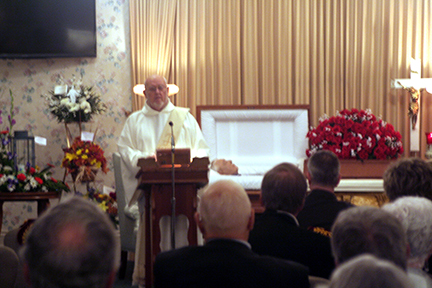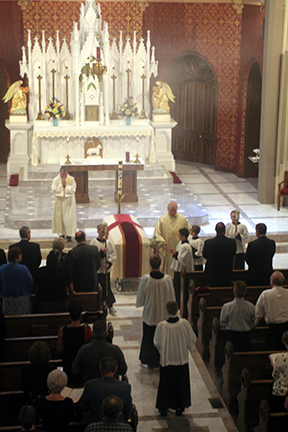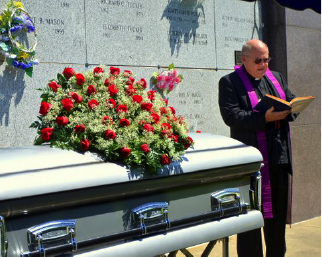CHRISTIAN BURIAL RITES
CATHOLIC FUNERALS
CATHOLIC CREMATION
HOME
CATHOLIC FUNERALS
The order of Christian funerals teaches that:
When a member of Christ’s Body dies, the faithful are called to a ministry of consolation to those who have suffered the loss of one whom they love. Christian consolation is rooted in that hope that comes from faith in the saving death and resurrection of the Lord Jesus Christ. Christian hope faces the reality of death and the anguish of grief but trusts confidently that the power of sin and death has been vanquished by the risen Lord. The Church calls each member of Christ’s Body- priest, deacon, layperson — to participate in the ministry of consolation: to care for the dying, to pray for the dead, to comfort those who mourn.
BURIAL RITES
Vigil
 At the vigil for the deceased or on another occasion before the eucharistic celebration, the presiding minister should invite all to be present at the funeral liturgy and to take an active part in it. The minister may also describe the funeral liturgy and explain why the community gathers to hear the word of God proclaimed and to celebrate the eucharist when one of the faithful dies. The priest and other ministers should also be mindful of those persons who are not members of the Catholic Church, or Catholics who are not involved in the life of the Church.
At the vigil for the deceased or on another occasion before the eucharistic celebration, the presiding minister should invite all to be present at the funeral liturgy and to take an active part in it. The minister may also describe the funeral liturgy and explain why the community gathers to hear the word of God proclaimed and to celebrate the eucharist when one of the faithful dies. The priest and other ministers should also be mindful of those persons who are not members of the Catholic Church, or Catholics who are not involved in the life of the Church.
Funeral Liturgy
 The Funeral Liturgy (Mass) is our great "Thank You" to God who created us, died for us, and who is calling each of us back to Himself. In this step the focus shifts slightly from emphasis on the deceased to God’s saving works though Jesus Christ. The Mass, particularly at the time of death, is truly a special moment, a holy moment, a God-moment.
The Funeral Liturgy (Mass) is our great "Thank You" to God who created us, died for us, and who is calling each of us back to Himself. In this step the focus shifts slightly from emphasis on the deceased to God’s saving works though Jesus Christ. The Mass, particularly at the time of death, is truly a special moment, a holy moment, a God-moment.
Celebrating the funeral liturgy at Mass in the parish church is the normal way in which most Catholics experience the Order of Christian Funerals. The Eucharist looks forward to our participation in the heavenly banquet, where we are united with Jesus, the saints, and all those who share eternal life. Jesus said, "whoever eats my flesh and drinks my blood shall live forever." (John 6:54) The Eucharist is truly the central point in a Catholic funeral. Its effectiveness is greatly enhanced when the family participates in appropriate ways: clothing the casket with the pall, selecting the Scripture readings, serving as lectors or extraordinary ministers, singing the responses and the hymns and, most especially, receiving Holy Communion.
The funeral homily is of utmost importance in the funeral liturgy. A homily may only be delivered by a priest or a deacon, as liturgical homilies are part of the sacramental rite of the Eucharist. The homily speaks of the mystery of Christ’s death and resurrection and gives the deeper meaning that is found in the experience of death and dying. The homily occurs within the context of a funeral Mass that is offered for the forgiveness of sins and the salvation of the soul of the faithful departed.
Committal
 The last step – the last concrete act we can do for our loved ones in this world – is the Committal, the burial or entombment of the remains of the deceased. The relationships, bonds and "communion" we build with one another in faith are not broken by death. Resting in a holy place with our brothers and sisters is a profound statement of that belief.
The last step – the last concrete act we can do for our loved ones in this world – is the Committal, the burial or entombment of the remains of the deceased. The relationships, bonds and "communion" we build with one another in faith are not broken by death. Resting in a holy place with our brothers and sisters is a profound statement of that belief.
The Rite of Committal is the final liturgy in the Order of Christian Funerals. Like the Vigil Service, the Rite of Committal makes use of Scripture, a few words of hope by the presider, intercessions and prayers.
A Catholic cemetery is a sacred place of honor and respect for those who have died. It is a memorial to all who are interred there. It is a sacred place where Catholics come to express their grief and hope in the resurrection for their loved ones who have preceded them in death. It is blessed ground, fitting for someone whose body was a temple of the Holy Spirit on earth and now awaits the resurrection from the dead.
To have a representative of the Church present at this final moment is a great source of consolation to those who will now have to continue their journey in life without their beloved. While a priest may be unable to preside at the Committal Service, a deacon or a trained bereavement minister may represent the Church at this final moment.




